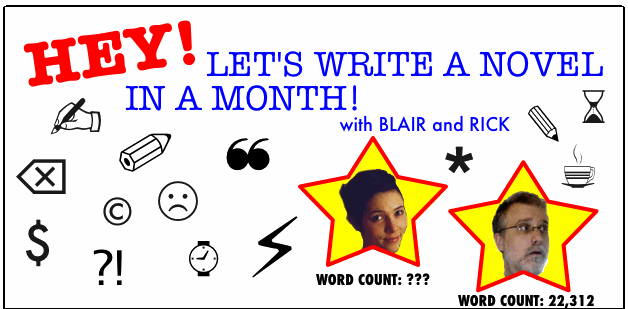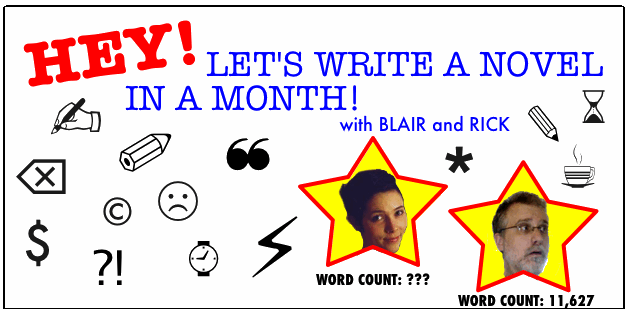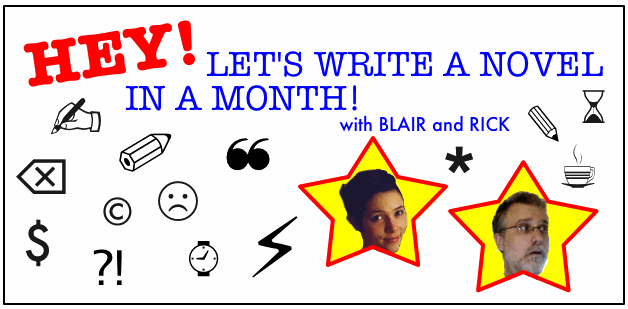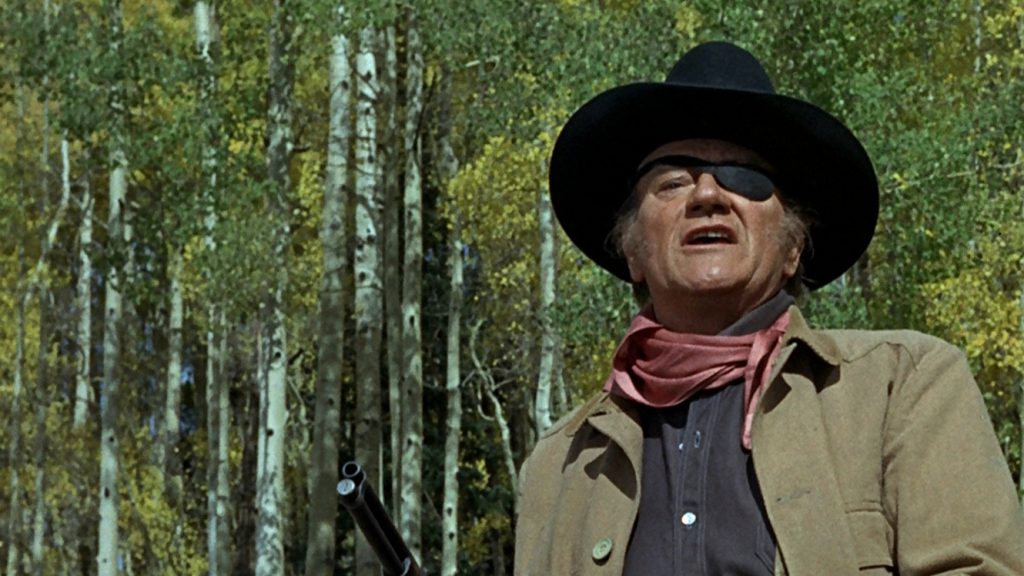Let’s write a novel in a month: Part 3—How to Cheat
I am trying to write a 50,000-word novel by the end of the month. So are a few thousand other people in the Camp NaNoWriMo program. Why? The reasons vary. I suspect brain damage to be very high on the list.
And yet, I find myself hating the experience only about 75% as much as I thought I would. In fact, so far I’ve found it to be quite enlightening. Because the pressure to vomit out a thousand words or so every day has driven me to develop a number of, well, let’s call them “techniques” that help keep the ol’ word count ticking upwards. These are just variations on time-honored methods that great authors have used throughout history, but not everybody knows about them (I didn’t). So I thought I’d share them here, in the hopes that they’ll help you add bulk to your next big writing project, whatever it might be.
Tip # 1: Use Catchphrases! As TV-watchers are well aware, the catchphrase is an oft-repeated, trademark utterance that a character uses whenever the appropriate situation arises. Examples range from “Ay Caramba” (Bart Simpson) to “Dy-No-Mite!” (J.J. Walker) to “Ay Caramba!” (Ricky Ricardo). But did you know that great literature also contains numerous catch phrases? How many times did Sal Paradise cry out “Cool it, daddy-O” in On The Road? And what about “And they call me a monster,” the famous retort favored by the creature in Mary Shelley’s Frankenstein? If you don’t give your characters their own stock catchphrases, you end up doing what writers call “reinventing the wheel.” In other words, you have to keep coming up with new things for your characters to say when you could just fall back on a phrase that you’ve already invented. And that wastes precious writing time.
Tip # 2: Awkward conversations. Think about how people talk in real life: Incomplete sentences, confusing nonsequiturs, awkward pauses, interruptions and long sentences that don’t go anywhere. Good writers try to replicate that in their dialog whenever possible. Why? Because when people speak incoherently, they end up having to repeat themselves, and that can add significantly to your word count! For example, consider this exchange:
"Who told thee that?" cried Ahab; then pausing, "Aye, Starbuck; aye, my hearties all round; it was Moby Dick that dismasted me—“
“Sorry, cap’n,” interrupted Starbuck, “Did you get a chance to sign that voucher I left on your desk?”
“Eh?”
“What?”
“What? You just asked me something?”
“Oh, I thought you were—I mean—never mind. Yeah, I was—”
“Hold it. My peg-leg’s coming loose—”
“What? It’s really hard to hear with the wind blowing so much—”
You get the idea. See how skillfully Melville is able to stretch out what could be a simple one-minute conversation? Master this technique and you can easily double, or triple, your daily word count.
# 3: Hyperbole. You and I live in the real world where everything is flat and boring. But people don’t want to read about that—they want to read about incredible places with unbelievable characters doing unprecedented things. That means you are free to use as many words as it takes to amp up the action. Example:
Dr. Henderson made the first incision into his patient’s brain. (Boring.)
Dr. Henderson very carefully made the first very difficult incision into his very ill patient’s disgusting-looking brain. (Better.)
The incredibly skilled top-rated surgeon Dr. Henderson very, very, very carefully made the first incredibly precise, very, very, very, very difficult incision into his really very seriously ill deadbeat patient’s disgusting-looking, bloody, very surprisingly gross, swollen and quite disgusting-looking brain. (Hello National Book Award!)
# 4: Conflict. There is no drama without conflict. But don’t fall into the trap of thinking that the only conflict is between protagonist and antagonist. If you really want a compelling and high word-count story, every one of your characters should be in conflict with every other character. They should be constantly disagreeing with each other, unable to reach a consensus about anything without a drawn-out argument first. Consider:
“Sarasate plays at the St. James’s Hall this afternoon,” he remarked. “What do you think, Watson? Could your patients spare you for a few hours?”
“I have nothing to do to-day. My practice is never very absorbing.”
“Then put on your hat and come. I am going through the City first, and we can have some lunch on the way.”
“It’s not cold outside, Holmes. I don’t need my hat.”
“Don’t be an idiot, Watson. Of course you need your hat.”
“And I’ve had lunch already.”
“Just wear your hat. I’m wearing mine and I don’t want to be the only one wearing a hat. I won't be made a fool of.”
“I don’t even have my hat with me.”
“What are you talking about? That’s your hat right there.”
“No it isn’t.”
"Goddamn it, Watson."
And so on! When two characters don’t get along, the simple of tasks can stretch on and on for pages. It’s not only compelling drama, it fills out your manuscript like a padded bra.
Now don't get me wrong, there are plenty of other ways to improve your writing and create a very long, and therefore very good, work of fiction. We haven't even talked about adverb inflation, random word seeding, internal monolog echo, emphatic redundancy, flashback-in-flashback…all supremely useful tools to have in your utility belt. But start with these four techniques and you'll be well on your way. Happy writing! (There is no such thing.)

Rick Chillot
RICK CHILLOT is a former baby and current writer and editor at Quirk Books. He has contributed to magazines such as Psychology Today, Parenting, Mental Floss, and Prevention. In his twenty-plus years in publishing he’s interviewed about a jillion scientists and doctors and therefore had no need to consult any of them for this book.




